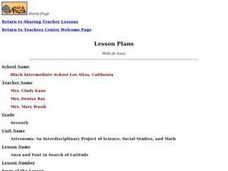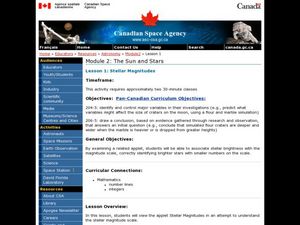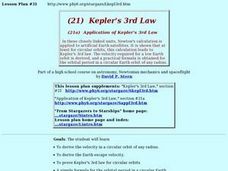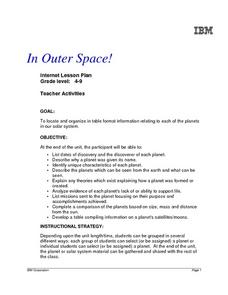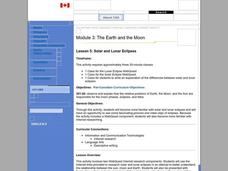Curated OER
What's Up? Astronomy Curriculum
Students study astronomy. In preparation for a field trip to a planetarium, students discuss the stars, planets, and light. They explore the importance of the north star and constellations. The Digitarium system is used to assist the...
Curated OER
What's Up?
Students compare and contrast the various heavenly bodies found in the sky at night. They identify the moon and stars in the sky as well as how the stars form pictures called constellations. Students also experiment with reflection and...
Curated OER
Constellations
Middle schoolers explore the major constellations. After reviewing the Earth's basic motions and their significance, students discuss the moon's orbit and revolutions. Using a Digitarium Alpha portable planetarium projector, they...
Curated OER
Planets or Not, Here We Come!
Students, working in groups, research planets in terms of the size, temperature, number of moons, and potential for life. They use packets and worksheets as guides for their research. Students may role-play as aliens visiting their...
Curated OER
Building a Scale Model
Third graders create a model of the solar system. In this solar system instructional activity, 3rd graders create a scale model of the solar system. Working in pairs students solve mathematical problems to correctly measure the distance...
Curated OER
Comets
Students explore the nature and composition of a comet. They research comet facts, legends, and myths. They identify different types of comets and describe what happens to a comet as it travels closer to the Sun.
Curated OER
Hopping Across the Solar System
Young scholars role-play and communicate that objects in space have describable properties, locations, and movements. Students identify and communicate effectively that Earth is the third planet from the Sun in the solar system, eight...
Curated OER
Anza and Font in Search of Latitude
This is an integrated lesson that incorporates Social Studies, Science, and Mathematics. In Social Studies, 7th graders complete an online interview and complete an online worksheet about latitude of sites on the Anza trail. In Science...
Curated OER
Galaxies and the Universe
If Earth was formed 4600 million years ago, and the sun revolves about the center of the Milky Way once every 250 million years, how many revolutions have occurred? Students answer this question and ten more, all providing students with...
Curated OER
Large Numbers- the Planets
In this writing distances instructional activity, students re-write the chart to show the distance each planet sits from the sun using words rather than numbers, all measurements are in km.
Curated OER
Stellar Magnitudes
Students analyze the stellar magnitude scale. In this stellar magnitude lesson, students examine the stellar magnitude scale. Students predict the Sun's magnitude from various planets.
Curated OER
Kepler's 3rd Law
Learners derive the velocity in a circular orbit of any radius. They derive the Earth escape velocity and prove Kepler's 3rd law for circular orbits # A simple formula for the orbital period in a circular Earth orbit of given radius.
Curated OER
Cold Fronts And Warm Fronts
Students simulate the movement of cold and warm fronts as they listen to a story about the weather and Mr. Sun. They brainstorm the characteristics of each type of front then write about which front they would prefer if they were a...
Curated OER
Inner Planets
Students create a booklet about the inner planets after researching the characteristics of each planet. Students research the following items for each planet: moons, size, rotation, orbit, atmosphere, an interesting fact. Their final...
Curated OER
In Outer Space
Students use the internet to gather information on the solar system. They identify the discoverer and unique characteristics of each planet. They compare and contrast each planet based on size, mass, and distance from the sun. They...
Curated OER
Keeping Warm
Students place words describing a range from cold to hot on a scale. Using those words, they identify places on Earth which are cold, hot, freezing or boiling. They practice using and reading a thermometer with three different beakers...
Curated OER
Star Child Astronomy
Students gain understanding of the relationship of Earth within the Solar System. They increase knowlegde of the planets, sun, moon, meteoroids, asteroids and comets.
Curated OER
Graphing San Diego Tides
Students observe the tides in San Diego for one month. Using this information, they graph the tides on a chart along with the phases of the moon. They answer questions related to the graph to end the lesson.
Curated OER
As the World Turns
Third graders read books and participate in class discussions about the motion of the stars and planets and moons in relation to the Earth. In small groups, 3rd graders act out these movements to music.
Curated OER
"Space" Investigations
Sixth graders understand the patterns of change observable on Earth as a result of the movement of the different bodies in the solar system. They identify the physical characteristics of the different components of the solar system.
Curated OER
Yin And Yang
Students examine the symbols of change, Heaven and Earth, as expressed in
Chinese art and literature in this High School lesson. Evaluation is accomplished through a short, small-group research project.
Curated OER
Solar and Lunar Eclipses
Students complete a WebQuest in order to better explain solar and lunar eclipses. They observe images and videos of eclipses from around the world.
Curated OER
Space Facts
Students read space facts and click on the links to research more about space objects. In this space lesson plan, students read about comets, planets, the moon, and more.
Other popular searches
- Earth Moon Sun System
- Sun Earth and Moon
- Sun Moon Earth
- Earth and Moon and Sun
- Earth, Moon and Sun
- Rubric Sun Moon Earth
- Sun, Earth and Moon
- Sun Earth Moon System









